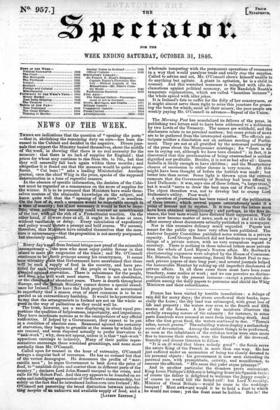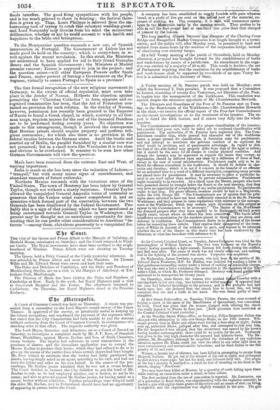France has been visited by terrible inundations : a deluge
of rain fell for many days; the rivers overflowed their banks, espe- cially the Loire; the dry land was submerged, with great loss of life and property ; the waters rose even to the fourth and fifth stories of the houses. A few of the incidents illustrate the awfully sweeping nature of the calamity : for instance, in some parts hundreds were rescued at once from impending death. And after the first great flood, the waters continued to rise. "Terruit urbes, temiit gentes." The subsiding waters display a melancholy scene of devastation. Among the earliest things to be performed, as soon as the inhabitants of the stricken towns were once more free to traverse their streets, were the funerals of the drowned. Scarcity and disease threaten to follow. "It is an ill wind that blows nobody good" the floods serve the astute King of the French in more than one way. He has just suffered under an accusation of being too closely devoted to his personal objects : his government is now seen extending its paternal care, with promptitude, activity, and munificence, to succour the afflicted. " Hic amen dici pater atque princeps !" And in another particular the disasters prove convenient. King Louis Philippe's fifth son is bringing home his Spanish bride: of course the father is delighted to welcome the )happy couple ; of course he would kill the fatted calf: but Lord Normanby, Minister of Great Britain— would he come to the wedding- banquet ? Most awkward would it be to hold a feast to which he would not come; yet the feast must be holden. But lo 1 the
floods interfere. The good King sympathizes with his people, i and is too much grieved to share in feasting.: the festival there- fore is given up. Thus, Louis Philippe is relieved from the em- barrassing task of trying to catch that reluctant wedding-guest ; and Lord Normanby may dismiss from his mind the momentous deliberation, whether or not he could consent to wish health and happiness to the bride and bridegroom.



























